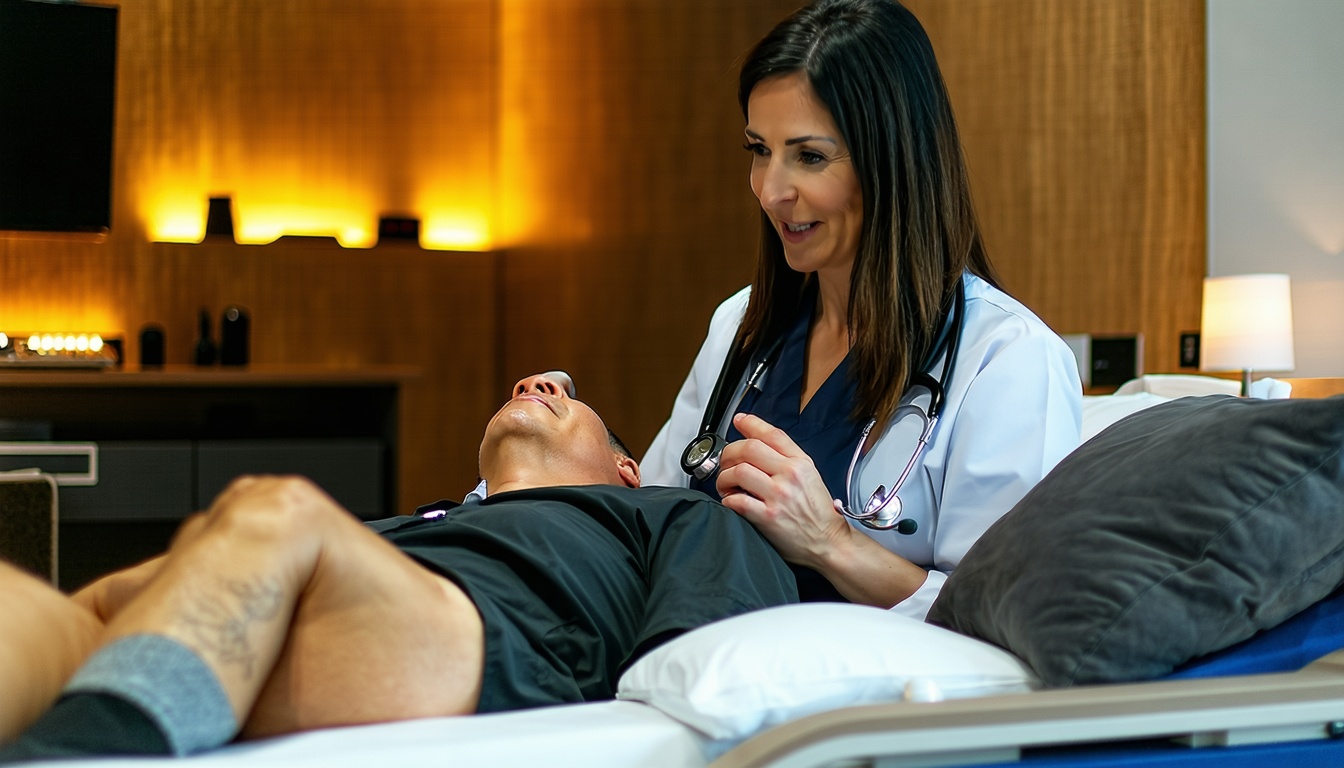Why Choose Recovery Bay Center
Choosing the right facility for medical detox is a crucial decision in the journey to recovery. At Recovery Bay Center, we provide a safe and supportive environment tailored to meet your needs.
Professional Detox Facilities
Our professionally supervised detox facilities play a key role in effectively treating substance use disorders. Medical supervision ensures the safe elimination of substances from the body while managing potentially severe withdrawal symptoms. This critical first step is conducted under 24/7 medical supervision, which is essential for both drug and alcohol detox. Here at Recovery Bay Center, we understand that managing withdrawal safely with 24/7 medical supervision significantly enhances the overall detox experience for individuals seeking recovery. For more information about what to expect, read our article on what to expect during medical detox at a professional facility.
24/7 Medical Supervision
The cornerstone of our detox approach is our commitment to providing 24/7 medical supervision. This supervised environment allows trained professionals to closely monitor vital signs and overall health, effectively mitigating the risks associated with withdrawal symptoms and potential complications. Studies have shown that medically supervised detox can reduce complications by up to 68% and increase successful completion rates by 40% (Evoke Wellness OH). This continuous oversight supports individuals through the most vulnerable phase of detox, ensuring their safety and well-being.
| Benefits of 24/7 Medical Supervision | Percentage Improvement |
|---|---|
| Reduction in complications | 68% |
| Increased successful completion rates | 40% |
At Recovery Bay Center, we prioritize your recovery and well-being through our comprehensive approach. For those dealing with specific substances, our resources include tailored information like detoxing from opioids vs. alcohol: differences in care and support and understanding unique detox challenges such as understanding fentanyl detox: risks and protocols. Our facility is equipped to support every step of your detox journey, setting the stage for successful long-term sobriety, as we explain in our article on how detox sets the foundation for long-term sobriety.
Benefits of Medical Detox
When considering recovery options, we understand the importance of safely managing withdrawal and providing the necessary support throughout the detox process. Medical detox at Recovery Bay Center offers numerous benefits aimed at ensuring a smooth transition for individuals seeking a healthier lifestyle.
Safely Managing Withdrawal
One of the primary benefits of medical detox is the ability to manage withdrawal symptoms under professional supervision. A skilled team of doctors and nurses closely monitors patients and employs strategies to alleviate discomfort associated with withdrawal. This approach minimizes the risk of dangerous complications, making the process far safer and more effective. Medical detox can be immensely helpful, particularly for individuals struggling with addictions to alcohol, opioids, benzodiazepines, and other sedatives, allowing them to achieve a state of safety and mental and physical stability (American Addiction Centers).
| Substance | Common Withdrawal Symptoms | Importance of Medical Detox |
|---|---|---|
| Alcohol | Anxiety, tremors, seizures | Reduces complications |
| Opioids | Pain, insomnia, nausea | Alleviates discomfort |
| Benzodiazepines | Anxiety, seizures, insomnia | Monitored for safety |
The table above highlights the significance of medical detox in managing withdrawal symptoms effectively.
Expert Staff Support
At Recovery Bay Center, patients benefit from round-the-clock medical supervision during the detox process. This continuous support ensures that medical professionals are always available to address any arising issues and provide immediate interventions if necessary. Medically supervised detox is a critical first step in breaking free from addiction, ensuring that individuals receive the expert care they need to safely manage their withdrawal symptoms (Evoke Wellness Ohio).
In addition to immediate medical care, our expert staff also provides emotional support. Understanding that detox is a challenging experience, our team is trained to offer compassion and understanding to each patient, helping them navigate the emotional aspects of recovery.
As reported in 2020, over 40 million Americans aged 12 and older struggled with Substance Use Disorder (SUD), underscoring the critical importance of medical supervision during the detox process (Evoke Wellness Ohio). Attempting detox without proper medical support can be extremely dangerous and often ineffective, particularly for those with severe addictions.
Choosing Recovery Bay Center means selecting a path that prioritizes safety and a supportive environment in managing withdrawal effectively, setting the groundwork for long-term recovery success. For further insights on the detox journey, consider exploring our article on what to expect during medical detox at a professional facility.
Importance of Medical Monitoring
Ensuring Safety and Well-being
At Recovery Bay Center, we prioritize the safety and well-being of those undergoing detoxification. Medical monitoring is essential in this process, as it allows us to address any potential adverse reactions swiftly and effectively. It significantly reduces the risk of complications associated with withdrawal, ensuring our clients receive the necessary personalized care throughout their detox journey (Nextep Recovery Services).
A critical aspect of safe detox is creating a serene environment where patients can rest and recuperate. During this time, our medical staff is available 24 hours a day, providing constant oversight and support. By accommodating individuals in a calm withdrawal management area, we help alleviate anxiety and fears associated with the detox process. This thoughtful approach fosters trust between patients and treatment staff, promoting a more effective healing process.
Prompt Intervention
Understanding the timeline and symptoms of withdrawal is essential for timely intervention. For instance, alcohol withdrawal can present life-threatening symptoms within 6 to 24 hours after cessation, peaking between 36 to 72 hours and lasting anywhere from 2 to 10 days. Our medical team is equipped with detailed management plans based on the severity of symptoms.
Prompt intervention can significantly impact recovery outcomes. Should any severe symptoms emerge, such as seizures or hallucinations, our staff is trained to respond immediately, providing the necessary treatments to stabilize the individual. This proactive approach ensures that recovery is safe and supportive, laying the groundwork for a seamless transition into further rehabilitation services.
We encourage anyone interested in the detox process to learn more about what to expect during medical detox at a professional facility and how we can support your or your loved one’s recovery journey.
Personalized Care in Detox
At Recovery Bay Center, we understand that each individual experiences withdrawal and recovery differently. Tailored treatment plans and addressing specific needs are essential components of our approach to ensuring effective and compassionate care during the detox process.
Tailored Treatment Plans
Creating a customized treatment plan allows us to address each individual’s unique circumstances and requirements. Our team of experts carefully evaluates several factors including medical history, the severity of addiction, and personal preferences. By understanding the specific challenges faced by each patient, we can craft a plan that incorporates medication-assisted treatments and supportive therapies.
| Key Elements in Tailored Treatment Plans | Details |
|---|---|
| Medical History Review | Thorough assessment of past medical issues to guide treatment decisions. |
| Individualized Medication Regimen | Use of medications like clonidine, buprenorphine, or methadone as needed to alleviate withdrawal symptoms and support recovery (Evoke Wellness OH). |
| Psychosocial Support | Access to counseling and support groups tailored to individual recovery paths. |
Our aim is to reduce discomfort and create a trusting environment. This approach not only aids in managing withdrawal symptoms effectively, but it also fosters a supportive relationship between patients and staff (NCBI Bookshelf).
Addressing Specific Needs
Recognizing and addressing specific needs during detox is crucial for effective recovery. Each person’s experience can vary significantly, especially when it comes to the type of substance involved in their addiction. By ensuring that we cater to the distinct requirements of each individual, we enhance the overall effectiveness of the detox process.
For instance, opioid withdrawal management necessitates close monitoring and may involve medications like methadone or naltrexone to ease cravings, as well as psychological support to address mental health aspects of addiction (Evoke Wellness OH). We also ensure that the detox environment is calm and conducive to recovery, which includes providing our patients with a quiet area away from those who have already completed withdrawal.
To further support our patients, we avoid recommending physical exercise, as it may exacerbate symptoms during withdrawal (NCBI Bookshelf). Instead, we promote moderate activities such as walking and mindfulness practices to aid in relaxation and recovery.
Through our personalized care approach, we create a comprehensive framework that sets a solid foundation for long-term sobriety. For more insights on managing withdrawal and other related topics, explore our articles on what to expect during medical detox at a professional facility and why medical detox is essential before starting rehab.
Managing Withdrawal Symptoms
Effective management of withdrawal symptoms is crucial for a successful detox experience. At Recovery Bay Center, we prioritize comprehensive care through medication-assisted treatments and careful attention to withdrawal timelines and risks.
Medication-Assisted Treatments
Medication-assisted treatments are often recommended to ease both cravings and discomfort during detox. These medications address the physical and psychological aspects of addiction. Common medications include methadone, buprenorphine, and naltrexone, tailored to individual needs (Evoke Wellness OH).
For opioid withdrawal management, a selection of medications can be utilized to alleviate symptoms, including clonidine, buprenorphine, methadone, and codeine phosphate. Proper dosing is critical, as it should be monitored and adjusted based on symptom control and side effects (NCBI Bookshelf). This personalized approach ensures that our patients receive the care necessary to manage their withdrawal symptoms effectively.
| Medication | Purpose |
|---|---|
| Methadone | Reduces cravings and withdrawal symptoms |
| Buprenorphine | Alleviates withdrawal symptoms |
| Naltrexone | Blocks cravings for opioids |
| Clonidine | Reduces specific withdrawal symptoms |
We emphasize the importance of developing personalized withdrawal management plans. These plans consider an individual’s specific needs, the substances they used, the duration of use, and their overall health factors. This tailored approach maximizes the likelihood of a successful detox experience by incorporating specific medications and therapies aimed at easing withdrawal symptoms. Regular check-ins with healthcare providers allow for necessary adjustments throughout the detox process.
Withdrawal Timeline and Risks
Understanding the withdrawal timeline is essential for effective management. Certain substances, such as alcohol, can cause withdrawal symptoms to arise within hours of the last dose, with serious risks persisting for several days. It is imperative to manage alcohol withdrawal in a medical setting, as it can be life-threatening if not addressed properly.
Here’s a basic overview of withdrawal timelines for different substances:
| Substance | Time for Initial Symptoms | Duration of Withdrawal Symptoms |
|---|---|---|
| Alcohol | 6 hours | Up to 10 days |
| Opioids | 12-24 hours | Up to 10 days |
| Benzodiazepines | 1-3 days | 10 days to weeks |
Proper medical monitoring during detox ensures that personalized care is provided. This tailored approach helps in adjusting treatment plans based on the evolving needs of the individual. Our goal is to promote safety and facilitate a supportive environment that enhances the detox experience. For a deeper understanding of what to expect during medical detox, visit our article on what to expect during medical detox at a professional facility.
Holistic Approaches to Detox
At Recovery Bay Center, we recognize the importance of incorporating holistic approaches when managing withdrawal during the medical detox process. These methods enhance overall well-being and support the body as it transitions away from dependency on substances. Two critical components of this holistic approach are hydration and nutrition, along with mindfulness and relaxation techniques.
Hydration and Nutrition
Proper hydration and nutrition play a vital role in alleviating withdrawal symptoms for substances like alcohol and opioids. Maintaining adequate hydration helps in reducing headaches, fatigue, and other physical discomforts associated with withdrawal. Nutritional support is equally crucial. A diet emphasizing fruits, vegetables, and whole grains provides essential nutrients that can support recovery and help manage mood swings and cravings.
| Nutrient | Role in Recovery |
|---|---|
| Fruits | Provide vitamins and antioxidants |
| Vegetables | Offer fiber and essential nutrients |
| Whole Grains | Stabilize blood sugar and energy levels |
Implementing these dietary changes can significantly enhance the detox experience and provide the body with the energy it needs to heal. For more insights on what to expect during medical detox, see our article on what to expect during medical detox at a professional facility.
Mindfulness and Relaxation Techniques
In addition to nutrition, incorporating mindfulness and relaxation techniques can be beneficial during the detoxification process. Practices such as deep breathing exercises, yoga, and meditation can help manage anxiety and stress, which often accompany withdrawal symptoms. These techniques promote mental clarity and emotional stability, making the detox journey more manageable.
Engaging in mindfulness can help individuals develop a greater awareness of their thoughts and feelings, assisting them in coping with cravings and improving their overall mental health. For those interested in further understanding how detox sets the foundation for long-term sobriety, visit our article on how detox sets the foundation for long-term sobriety.
By acknowledging the significance of these holistic methods, we at Recovery Bay Center aim to provide comprehensive care that supports not only physical health but also emotional well-being during this critical period of recovery.





